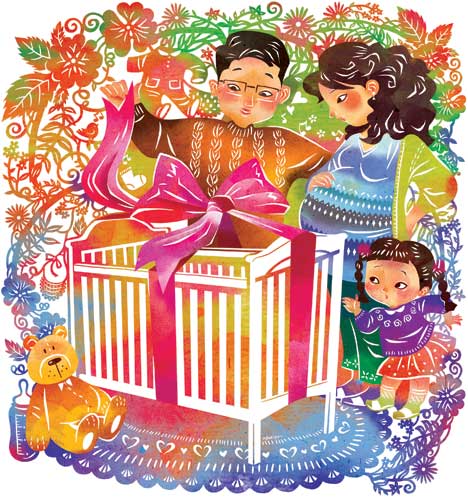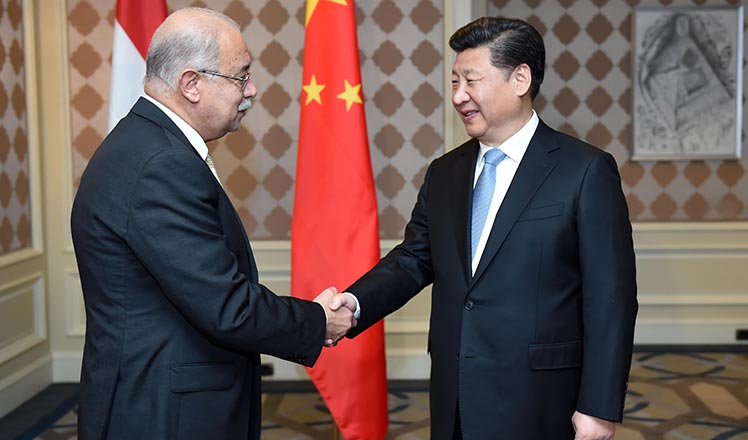Couples to untie pregnancy knot
Updated: 2016-01-25 02:34
By SHAN JUAN(China Daily)
|
|||||||||
With the government ready to foot the bill, many mothers are considering reversing medical procedures that prevent conception
 |
|
Li Min/China Daily |
About 20 million women in China are expected to have free operations to help them recover their fertility after the introduction of a policy encouraging all couples to have two children. The "free-recovery" initiative was announced by the National Health and Family Planning Commission after the top legislature approved an amendment to the Population and Family Planning Law in late December. The commission said in a statement on Jan 6 that the free surgery should be available to women who used long-term contraceptive measures — mainly intrauterine devices and tubal ligation, also known as tube tying — to help recover their fertility if they want a second child. The move is expected to benefit about 20 million nationwide, according to Yuan Xin, a population studies expert at Nankai University in Tianjin who sits on the commission's panel of experts.
Long-term contraceptive measures, particularly the IUD, have been used widely in China to conform with family planning regulations. Official statistics show that about 54 percent of married women of childbearing age had IUDs fitted, and 26 percent underwent tubal ligation.
Ding Baorong, a staff member at Baqiao family planning bureau in Xi'an, Shaanxi province, said some women were willing to undergo the procedures but others were not.
In many places, couples faced problems in obtaining a hukou, or residence permit, for a child if the woman rejected the IUD.
Ding performed between 20 and 30 procedures a day for 10 years at the local family planning service center — mainly IUD implants and removal, tubal ligation and abortions.
Ding welcomed the free operations and suggested that they be extended to cover women past their reproductive prime.
"These women made a contribution to the family planning policy by heeding government calls to have IUDs or tubal ligation," she said.
Gao Lihong, a doctor at Jiaxing Maternity and Child Health Care Hospital in Zhejiang province, said IUDs usually have to be removed after five to 10 years of being implanted, due to the risk of infection.
From 1980 — when China adopted the one-child policy — to 2009, a total of 286 million IUD implants and 99 million tubal ligations were carried out in China, according to official records.
- Netizen backlash 'ugly' Spring Festival Gala mascot
- China builds Mongolian language corpus
- China's urban unemployment rate steady at 4.05 pct
- German ecologist helps relieve poverty in Sichuan
- 'Unhurried' Guizhou village makes NY Times list of places to visit
- Railway police nab 40,315 fugitives in 2015
- 7 policemen, 3 civilians killed in Egypt's Giza blast
- Former US Marine held in Iran arrives home after swap
- Powerful snowstorm threatens US East Coast; flights canceled
- 2015 Earth's hottest year on record: US agencies
- 8 killed in car bomb near Russian Embassy in Kabul
- Researchers find possible ninth planet beyond Neptune

 Storm grips New York after dumping 2 feet of snow on Washington
Storm grips New York after dumping 2 feet of snow on Washington
 Art exhibitions in 2016 worth seeing
Art exhibitions in 2016 worth seeing
 Winter flexes its muscles as cold snap makes its way
Winter flexes its muscles as cold snap makes its way
 Snow blankets Washington D.C. in potentially record-breaking storm
Snow blankets Washington D.C. in potentially record-breaking storm
 Bright Temple of Heaven shines in winter
Bright Temple of Heaven shines in winter
 Netizen backlash 'ugly' Spring Festival Gala mascot
Netizen backlash 'ugly' Spring Festival Gala mascot
 Egyptian welcome for Chinese President Xi Jinping
Egyptian welcome for Chinese President Xi Jinping
 Robots reads China Daily to stay up to date with news in Davos
Robots reads China Daily to stay up to date with news in Davos
Most Viewed
Editor's Picks

|

|

|

|

|

|
Today's Top News
National Art Museum showing 400 puppets in new exhibition
Finest Chinese porcelains expected to fetch over $28 million
Monkey portraits by Chinese ink painting masters
Beijing's movie fans in for new experience
Obama to deliver final State of the Union speech
Shooting rampage at US social services agency leaves 14 dead
Chinese bargain hunters are changing the retail game
Chinese president arrives in Turkey for G20 summit
US Weekly

|

|








